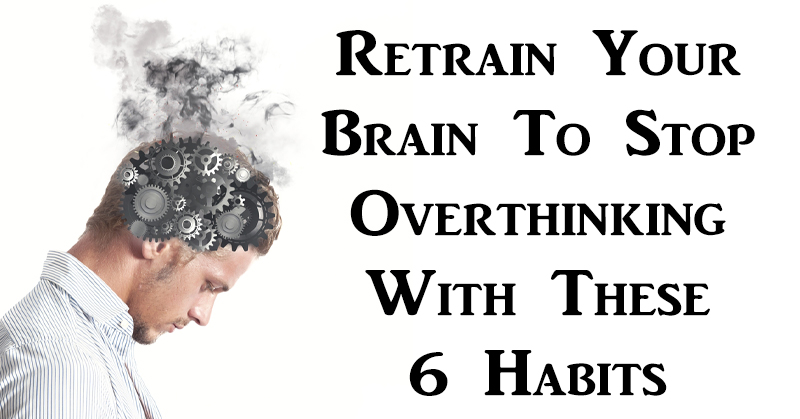Your brain is a powerful tool and it can make or break you. If you let them, your thoughts can drive you crazy. Mulling over deep thoughts is a favorite pastime for some, but for others, the barrage of thoughts quickly leads to anxiety attacks, nightmares, and other undesirable outcomes. And at its worst, overthinking can affect your quality of life and negatively impact how you relate to others.
Regain your productivity and put the brakes on overthinking by putting some of these techniques into practice:
1. Focus on the Big Picture
Overthinkers have a more difficult time recalling information because they are too focused on details. Retrain your brain with the following method: Grab a picture book, flip open to a random page, and study the image for five seconds. Close the book and try to recall everything you saw. The short time allotted inhibits your brain from overthinking. Repeat this process often until you feel assured in your brain’s ability to quickly process information.
2. Be Comfortable with Uncertainty
You can’t solve uncertainties, so stop focusing on them. Overthinkers like to ask questions that have no answers. Overthinkers also dwell on questions they think have no answers, likely due to a fear of conflict. Instead of driving yourself crazy by asking yourself ‘what could they have possibly meant by that?’ go straight to the source and ask. If you do not ask for the answer, then you need to be okay with not knowing.
3. Be a Problem Solver
Instead of focusing on why something happened, focus on what you can do about it. Write down the problem. This will tell your brain it can stop trying to remember it. Now, write down a concrete step towards a solution, and complete that step. If you can’t do anything about, accept that it is out of your control. But when this thought inevitably drives you insane, look back on your day, or your week, and focus on the positive things that happened. If it’s still making you insane, consider number 4 on this list.

4. Do Something Else
The onslaught of thoughts usually attacks during idle time. When the thought attack, get up and get moving. Complete a chore, exercise, or start up a conversation that has nothing to do with your thought category. If you’re driving alone, try engaging your brain in an activity, such as the “ABC Game”. In short, distract yourself.
5. Combat Emotion with Logic
It’s important to note that just like thoughts, emotions aren’t always based on facts. Emotions of an overthinker are often black and white. Allow the gray by admitting you don’t know everything, and just because something happened one way in the past doesn’t mean it will always happen that way in the future. Just because your friend didn’t call you back doesn’t necessarily mean she is mad at you. You are but a drop in an ocean of other people, all of whom have a wide variety of why they do the things they do, and most of it has nothing to do with you. And so what if you made a mistake? The question is, what did you learn from it? No, you’re not an idiot—you’re just human. Figure out what you will do differently next time and move on with your life. You are smarter and more capable than what your emotions and thoughts are telling you.
6. Allow Reflection Time
Permit yourself time to mull over your horde of thoughts. Set a timer and indulge yourself, but when your time is up, move on to something more productive. If you catch yourself slipping into overthinking mode, make a note of it and tell yourself “I’ll save that for my thinking time.” This is a good practice to incorporate into your daily schedule because thought-stopping altogether isn’t healthy. In other words, those monsters will eventually come out from under your bed. The question is whether or not you are going to allow them to run your whole life.
Sources:
Power of Positivity
Forbes
Psychology Today
Instructables


